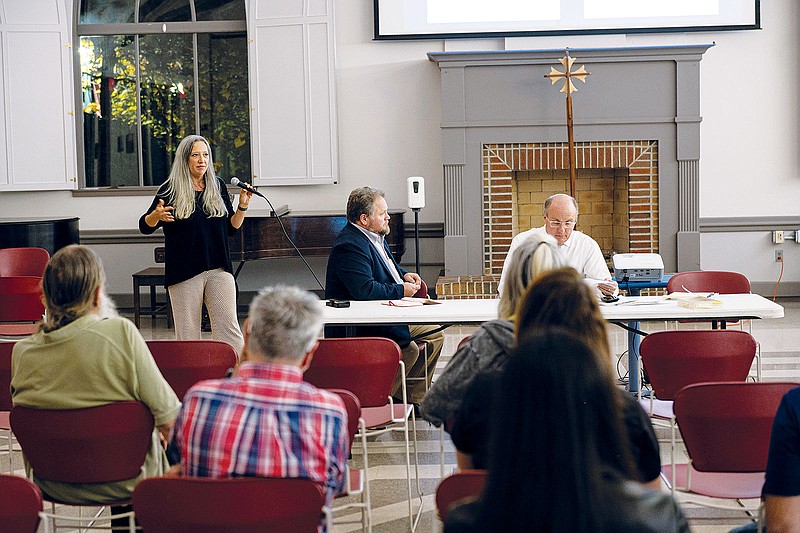Simply putting the state Freedom of Information Act into the Arkansas Constitution turned out to be not so simple, amendment supporters say.
The existing statute's language could, for instance, restrict Arkansas judges' ability to seal court records if put into the constitution, according to Jen Standerfer of Bentonville. Standerfer served as an attorney for the Bureau of Legislative Research before opening a private law practice in Rogers. The bureau drafts bills for lawmakers.
Now Standerfer is helping to draft the proposed amendment to add a public right to know law to the state constitution. Supporters hope to get such an amendment on the November 2024 general election ballot.
Laws lives in a hierarchy, Standerfer said during a Thursday town hall meeting on the proposal in Fayetteville. The state constitution takes precedence over state law. State law takes precedence over rules and regulations. When a statute conflicts with the constitution, the constitution wins. An amendment, however, revises the constitution. A new amendment supersedes all older provisions.
The Freedom of Information Act passed in 1967. The law grants access by the public to most government records and requires decision-making government bodies in Arkansas to make their meetings open to the public. The law and later revisions of it left the powers already spelled out in the constitution unaffected. The same wording in an amendment would not, she said.
The first draft of the proposed amendment said the law as it existed on Sept. 1 of this year would be restored. If the amendment passes, further changes would require a vote of the people instead of action by the Legislature. However, a similar law referring to a statute in North Dakota failed a court challenge there, former state lawmaker Nate Bell of Lincoln said at Thursday's meeting.
Bell and Standerfer are members of Arkansas Citizens for Transparency, the group behind the amendment drive.
The wording itself must go into the constitution, not a reference to something else, Bell and Standerfer said.
Attorney Joey McCutchen of Fort Smith, another Citizens for Transparency founder attending Thursday's meeting, addressed why the group wants an amendment.
"I think it's because we've seen an unprecedented level of attacks on the FOIA, and they're not limited to the governor," McCutchen said.
Gov. Sarah Huckabee Sanders supported a major rewrite of the Freedom of Information Act in a September special legislative session. A coalition of opponents stopped it. McCutchen cited Act 883 of 2023 as an attack that succeeded.
Act 883 allows school boards to go into nonpublic session to talk about pending or possible lawsuits, consider lawsuit settlement offers, consider contract disputes with the district superintendent, and to discuss buying or selling real estate. The board may also invite the district's superintendent and attorney into such an executive session. None of this was allowed before Act 883 became law.
Robert Steinbuch, a University of Arkansas at Little Rock professor, and Little Rock attorney John Tull III are members of the Arkansas Freedom of Information Act Task Force. The task force was created by state law in 2017 to review proposed changes to the transparency law and make recommendations to the Legislature.
They did not see Act 883's changes to the act before it became law. The provision was contained in a bill to increase the role of the state Ethics Commission in the oversight of school boards, both said in interviews in July.
"We dropped the ball," Steinbuch said then.
Having an extensive, written amendment proposal will make the drafting of a ballot title challenging, Bell said during the meeting. Ballot titles are what voters see at the polls. Ballot titles must be both accurate and comprehensive, he said. Those requirements make the titles a favorite point of attack in court cases to prevent a measure from getting to voters. Amendment supporters have to get the ballot title right before starting the process of getting the 90,704 petition signatures from registered Arkansas voters to get the measure on the ballot, he said.
Another concern is making sure the amendment is possible to follow for public officials, Standerfer said.
"It's not just us having access, but also letting them do their job," she said.
One aspect of making the proposed amendment practical is coming up with a working definition of what a public meeting is. What constituents a public meeting is too vague in existing law, panelists at the town meeting said.
Two members of the same governing body cannot meet and discuss governing business under the provisions of the law. Under that definition, a county judge or school superintendent could, for instance, talk individually with every member of a governing body and arrive at a consensus without ever violating the law, Bell and others said. At the other extreme, two city council members at the same football game or grocery store aisle couldn't talk to each other without raising suspicion they violated the law.
One aspect the proposed amendment will not address is on how long a public body needs to retain records. "You've hit my soapbox issue, and I've reluctantly come to the conclusion that issue is not appropriate for this amendment," Bell said when the topic came up Thursday.
"There are text messages being deleted every day, and I'm personally incensed by it," Bell said of messages between public officials.
On the web
AR Citizens for Transparency website:
https://arcitizens4transparency.org

